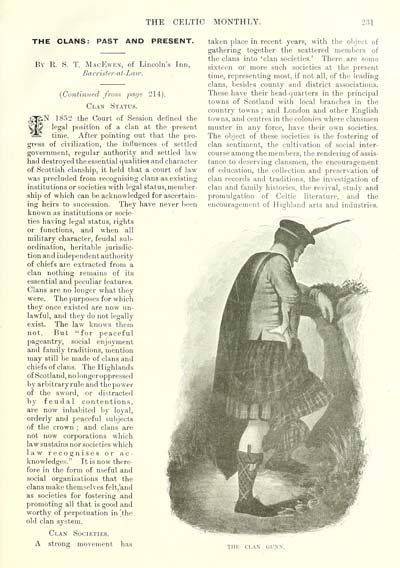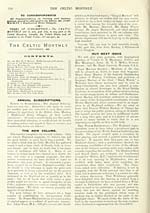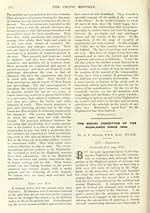Blair Collection > Celtic monthly > Volume 7, 1899
(329)
Download files
Complete book:
Individual page:
Thumbnail gallery: Grid view | List view

THE OELTIO MONTHLY.
331
THE CLANS: PAST AND PRESENT.
By R. S. T. MacEwen, of Lincoln's Inn,
Barrister-at-La tv.
{Continued from page 214).
Clan Status.
fN 18.52 the Court of Session defined the
legal position of a clan at the present
— time. After pointing out that the pro-
gress of civilization, the influences of settled
government, regular authority and settled law
had destroyed the essential qualities and character
of Scottish clanship, it held that a court of law
was precluded from recognising clans as existing
institutions or societies with legal status, member-
ship of which can be acknowledged for ascertain-
ing heirs to succession. They have never l)een
known as institutions or socie-
ties having legal status, rights
or functions, and when all
military character, feudal sub-
ordination, heritable jurisdic-
tion and independent authority
of chiefs are extracted from a
clan nothing remains of its
essential and peculiar features.
Clans are no longer what they -;
were. The purposes for which
they once existed are now un-
lawful, and they do not legally
exist. The law knows them
not. But "for peaceful
pageantry, social enjoyment
and family traditions, mention
may still be made of clans and
chiefs of clans. The Highlands
of Scotland, nolongeroppressed
by arbitrary rule and thepower
of the sword, or distracted
by feudal contentions,
are now inhabited by loyal,
orderly and peaceful subjects
of tlie crown ; and clans are
not now corporations which
law sustains nor societies which
law recognises or ac-
knowledges." It is now there-
fore in the form of useful and
social organizations that the
clans make themselves felt,'and
as societies for fostering and
promoting all that is good and
worthy of perpetuation in 'the
old clan system.
Clan Societies.
A strong movement has
taken place in recent years, with the object of
gathering together the scattered members of
the clans into 'clan societies.' There are some
sixteen or more such societies at the present
time, representing most, if not all, of the leading
clans, besides county and district associations.
These have their head-quarters in the principal
towns of Scotland with local branches in the
country towns ; and London and other English
towns, and centres in the colonies where clansmen
muster in any force, have their own societies.
The object of these societies is the fostering of
clan sentiment, the cultivation of social inter-
course among the members, the rendering of assis-
tance to deserving clansmen, the encouragement
of education, the collection and preservation of
clan records and traditions, the investigation of
clan and family histories, the revival, study and
promulgation of Celtic literature, and the
encouragement of Highland arts and industries.
THE CLAN GUNN.
331
THE CLANS: PAST AND PRESENT.
By R. S. T. MacEwen, of Lincoln's Inn,
Barrister-at-La tv.
{Continued from page 214).
Clan Status.
fN 18.52 the Court of Session defined the
legal position of a clan at the present
— time. After pointing out that the pro-
gress of civilization, the influences of settled
government, regular authority and settled law
had destroyed the essential qualities and character
of Scottish clanship, it held that a court of law
was precluded from recognising clans as existing
institutions or societies with legal status, member-
ship of which can be acknowledged for ascertain-
ing heirs to succession. They have never l)een
known as institutions or socie-
ties having legal status, rights
or functions, and when all
military character, feudal sub-
ordination, heritable jurisdic-
tion and independent authority
of chiefs are extracted from a
clan nothing remains of its
essential and peculiar features.
Clans are no longer what they -;
were. The purposes for which
they once existed are now un-
lawful, and they do not legally
exist. The law knows them
not. But "for peaceful
pageantry, social enjoyment
and family traditions, mention
may still be made of clans and
chiefs of clans. The Highlands
of Scotland, nolongeroppressed
by arbitrary rule and thepower
of the sword, or distracted
by feudal contentions,
are now inhabited by loyal,
orderly and peaceful subjects
of tlie crown ; and clans are
not now corporations which
law sustains nor societies which
law recognises or ac-
knowledges." It is now there-
fore in the form of useful and
social organizations that the
clans make themselves felt,'and
as societies for fostering and
promoting all that is good and
worthy of perpetuation in 'the
old clan system.
Clan Societies.
A strong movement has
taken place in recent years, with the object of
gathering together the scattered members of
the clans into 'clan societies.' There are some
sixteen or more such societies at the present
time, representing most, if not all, of the leading
clans, besides county and district associations.
These have their head-quarters in the principal
towns of Scotland with local branches in the
country towns ; and London and other English
towns, and centres in the colonies where clansmen
muster in any force, have their own societies.
The object of these societies is the fostering of
clan sentiment, the cultivation of social inter-
course among the members, the rendering of assis-
tance to deserving clansmen, the encouragement
of education, the collection and preservation of
clan records and traditions, the investigation of
clan and family histories, the revival, study and
promulgation of Celtic literature, and the
encouragement of Highland arts and industries.
THE CLAN GUNN.
Set display mode to: Large image | Transcription
Images and transcriptions on this page, including medium image downloads, may be used under the Creative Commons Attribution 4.0 International Licence unless otherwise stated. ![]()
| Early Gaelic Book Collections > Blair Collection > Celtic monthly > Volume 7, 1899 > (329) |
|---|
| Permanent URL | https://digital.nls.uk/75862213 |
|---|
| Shelfmark | Blair.59 |
|---|---|
| Additional NLS resources: | |
| Attribution and copyright: |
|
| Description | A selection of books from a collection of more than 500 titles, mostly on religious and literary topics. Also includes some material dealing with other Celtic languages and societies. Collection created towards the end of the 19th century by Lady Evelyn Stewart Murray. |
|---|
| Description | Selected items from five 'Special and Named Printed Collections'. Includes books in Gaelic and other Celtic languages, works about the Gaels, their languages, literature, culture and history. |
|---|

